- Home
- Clive Barker
Shivers 7 Page 7
Shivers 7 Read online
Page 7
I felt shocked, and a little queasy, wondering why she’d decided to confide in me, but said nothing.
“I was nearly forty,” she went on. “So, the fact that I’d put on a little weight, that I wasn’t having periods, that I felt strange… I put it down to the menopause. I didn’t go to a doctor; why should I? No one else noticed anything odd. Something about the way the baby was lying meant I never looked pregnant.”
“When did you realize?”
“After I gave birth.”
This was so unexpected, I could do nothing but gape.
“I know, it sounds mad,” she said calmly, taking a tiny bite of her salad. “But I never guessed. I had been feeling constipated for several days, and then one evening, just as I got home, I started getting pains, low in my belly. I thought it must have been something I ate. The pain came and went through the night, but it wasn’t until the baby actually came out of me that I realized. And by the time I understood I was pregnant—well, I wasn’t anymore.”
She fell silent, looking weary, and for the first time I saw her as an old woman.
“So what did you do then?”
“Well, I picked him up, I cuddled him… I thought how strange he looked. It still seemed unreal to me, what had happened. I got a knife to cut the cord—I didn’t sterilize it; how could I, on my own, holding a baby, still attached to me…it was a clean knife, from the kitchen, and I just had to hope it was clean enough. I guess it was. I couldn’t think what to do with the cord, or the other stuff—placenta—it seemed wrong to just stuff it all in the bin, but that’s what I did. I cleaned up as best I could, although there was a spot on the carpet I never could get out—I finally had to get new carpet laid—and then I ran a bath…”
Impatient with all this detail, the pointless obsession with carpeting, I interrupted: “But what about the baby?”
“Oh, I took him into the bath with me, of course. I got him all nice and clean, and then I used a hand towel, the softest one I had, to dry him. I wished I had some clothes for him, but of course I didn’t, why would I, when I’d never expected…? I thought I could make a nappy out of a square of cloth, but the tea towels were too rough, and I only had a few silk scarves, and they weren’t the right shape. I thought about cutting up a pashmina, which was certainly soft enough, but one was black and the other pink…” She met my gaze and made an ironic mouth. “Of course, it was absurd, but people do often focus on irrelevant details when they’ve had a shock. I thought about going out to buy something, but I was so tired, and it was so late at night… In the end, I just cleared out a drawer, and lined it with both pashminas, and laid him down in that, just pulling the edge of the pink one up to his chin. He looked so sweet lying there, so peaceful, I could almost believe he was asleep.”
I felt a sickening pang as I understood. “He wasn’t? He died? Or…he was born dead?”
“He never made a sound, never opened his eyes. Never took a breath.”
I wondered, with an odd, internal lurch, half excitement, half fear, if I was hearing the confession of an old crime.
“What did you do?”
She gave the tiniest shrug, as if to say I should have known. “I went to bed. I slept, so deeply that in the morning it all seemed like a dream. I was still tired when the alarm went, too tired to think, really. I got dressed and went to work as usual.”
“But the baby?”
She shot me a look that said I wasn’t paying attention. “ I told you, I put him in a drawer.”
I’d been imagining that drawer pulled out. I shut my mouth and nodded.
The waiter arrived to ask if everything was all right. Florida indicated that he should take away her largely untouched salad, and, having lost my appetite, I did the same.
“Would you like something else?”
“Just coffee, thank you.”
When we were alone again, she continued her story. “Two days later, I flew to New York. We were in the middle of negotiations, hoping to establish the brand in America, and so, for the next few months, I was hardly at home at all, rarely for more than a few nights. It was one of those nights, or early mornings, when I was so jet-lagged I hardly knew what time it was, and so wired on the excitement of building my own company into a global brand that I didn’t care, that I happened to notice that small, dark patch on my bedroom carpet, and suddenly all the details rushed back, and I broke out in a cold sweat.
“I opened the drawer and there was my baby, looking just as sweet and peaceful as the day he was born, and yet…not exactly. Even before I picked him up I could see signs of change.”
My stomach clenched as I anticipated the gory details to come, and wondered about the smell. But she surprised me again.
“He was bigger, plumper than when I’d last seen him, almost too big for the drawer. When I lifted him out, I could tell that he’d gained weight. I held him close and kissed him, and although his skin was cool to the touch, and he didn’t breathe, he had that wonderful new baby smell. You know what I mean?”
“He was alive? After—how long since you left him there? A month?”
“Closer to three. No, he was still dead.”
“But you said that he’d grown, put on weight—that’s impossible.” She had to be winding me up, but I couldn’t imagine why, and it was totally out of character for the woman I knew.
The waiter arrived with our coffee, and she waited until he’d gone away again to say, quietly, intently, “I know it’s impossible, but it happened. I still can’t explain it except to call it a miracle.”
I thought that was no explanation at all. “So what did you do?”
“There was a twenty-four hour Asda or something not far away, so I went there and bought a cot and some clothes. After the end of the year, when I had more time at home, I redecorated the guest room for him. It was all right for a tiny baby to share my room, but he would need his own space as he was growing up.”
“You mean, he kept growing?”
“Yes. Just like a live baby.”
Maybe one thing was no more or less impossible than the other, but I was shocked. “You mean, he didn’t stay a baby? He grew into a little boy?”
“And then a bigger one.”
“Did you tell anyone?”
“Of course not.”
“Why not? If it really happened?”
“You don’t believe me.” She looked amused. “Of course not. What sane person would believe such an outrageous tale? Does that answer your question?”
“You could have taken him to a doctor.”
Her expression hardened. “Take my dead boy to a doctor? Why?”
“To find out the reason—”
She shook her head at me. “There is no reason, or not one that science can accept. If I turned up with a dead body of an unknown man, what do you suppose would happen?”
I shrugged as if I didn’t know, but of course, I knew as well as she did that she’d have fallen under suspicion of murder, whether the body was that of a baby, or a young man.
“At the very least, they’d take him away from me. And if I told the truth, they’d lock me up. And bury David. Even if someone believed me, and decided to observe him for a few weeks, and saw he wasn’t an ordinary corpse—what would be gained by that? We’d be a public freak-show. I don’t want that. Not for David, not for me. I thank my lucky stars that I’ve always been able to take care of him, that I have enough money.” She stopped abruptly and took a drink of coffee.
David. It was a nice name, I thought, Biblical, not exactly unusual, but kind of old-fashioned; I had the idea that it meant ‘beloved.’ It made the subject of Florida’s story much more real to me, and I found myself wondering if other babies, born dead, had the potential to continue to grow, if Florida wasn’t the first this had happened to, only the first to notice…
I caught myself, shocked by how easily I was sliding into belief. Was this some kind of weird test?
“And you’ve never told anyone?”
&nb
sp; She had a pretty good poker face, did Florida, but that was a game I played, too. I saw something in her expression respond to my question; just the quickest, tiniest flicker, but when she assured me that she’d never told anyone but me, I knew she was lying. And as that occurred to me, I realized that nothing else she’d told me had felt like a lie. At the very least, she believed
“So why are you telling me, now?”
She put down her cup and folded her hands together in front of her. “I think you know I’ve always been impressed by your performance. You are a positive asset to the company, and I should be very sorry to lose you, if…well, I can understand if you are considering moving on, striking out on your own.”
I sat very still. I hadn’t said a word to anyone about my plans. How could she know what I was thinking?
She grimaced. “Maybe I’m projecting. You see, you rather remind me of myself at your age, and although my situation was quite different, if I were you, I’d be thinking that now was the time to aim higher, and that would have to mean striking out on my own.
“I’m nearly seventy,” she said. “And although I’m not eager to retire, I can’t keep working at the same pace. I know I will have to hand over to someone else.”
She didn’t say “That could be you,” but she paused, and my mouth went dry with excitement and apprehension.
She went on, “Then there’s David’s welfare to consider. What happens to him when I die? I’ve made plenty of money, but he has special needs. I can’t put the money into a trust for him, or even open a bank account for him because, as far as the outside world is concerned, he doesn’t exist.”
She sighed. “If there were only someone I could trust to look after him when I’m gone… It wouldn’t be difficult. He’s so undemanding. Of course, if the two were tied in together—unofficially, of course—the running of the business, caring for my son—I’ve always known that I couldn’t pass it on to him, but as long as he benefits from my success, I’d be happy.” She gave me a look I’d never expected or imagined to see from my boss, the famously powerful, self-sufficient Florida McAfee, a look that was anxious and hopeful and almost pleading.
I said, “I’d like to meet this son of yours.”
* * *
We both made calls to reschedule our afternoons. It took her longer than me, not because she had more scheduled, but because her personal assistant was still very new to the job, and needed to be talked through it all. The woman who’d worked for her in that capacity for over a decade had left a few months earlier, to start a new life in Australia after coming into an unexpected inheritance or winning some lottery—I wasn’t sure of the exact details, just that she was now rich and somewhere far away.
When we were done, Florida’s driver took us to her house in Holland Park. The journey passed without conversation; she was busy with her iPhone, and I was too nervous to speak. This was a first for me, and I’d never heard of anyone being invited to her home. When she entertained, she rented some appropriate venue, a nightclub in central London or a villa in Italy.
The house was smaller than I’d expected, just an ordinary house on a quiet street. After entering, she took me straight upstairs.
The room behind the locked door was small, no bigger than my own walk-in wardrobe, kitted out like a home office with built-in shelves, desk and filing cabinet. But this was only a front: as she explained, “I was afraid that I might get a cleaner for whom a locked door was just too tempting to resist. And the more difficult I made the lock, the more likely it would seem there was something worth stealing, worth gossiping about, and attracting the attention of burglars.”
She pulled out a book in the middle of the third shelf down, revealing an electronic keypad. She keyed in a number and the bookshelf-wall opened to reveal a bedroom.
There was a window, on the back wall, curtains open, letting in the soft light of late afternoon. If a burglar had looked in, he’d see a few things worth stealing, although they were no more than the electronic goodies any reasonably well-off young man might own: the sleek laptop, the iPod in a Bose docking system. But if he saw those things, he’d also see their owner, stretched out, fully clothed, on top of the bed, as if asleep. It would take a little while, or a much closer inspection, to recognize the sleeper as a dead man.
“David,” said Florida, in a peculiarly gentle voice I’d never heard her use before. “Darling, I’ve brought someone to meet you. I’ve told you about her. It’s Leslie…you remember, I’ve told you about the clever girl I put in charge of R&D?”
Part of me wanted to turn and run like hell. And if I had, I have no doubt there would have been a handsome severance package in my near future, and maybe that would have been just the spur I needed to get out and start up my own company, although it’s likely there would have been some sort of non-competition clause to encourage me to go to New Zealand or Canada, or at least far enough from London so Florida wouldn’t have to see my face again.
But I was curious. I had to see him for myself, had to confront Florida’s secret. I would have to stare down at his closed, handsome face, and touch his cool skin; hold his unresponsive hand in mine; spend time with him, trying to know him, to figure out who he was and what was meant by his existence.
Later, in the weeks and months to come, Florida answered my questions as best she could, as she described her attempts to be a good mother to a child who could not respond, but she could never explain the mystery of their relationship to my satisfaction. Unlike David, I kept asking for more.
But she didn’t mind. My questions, my refusal to go away, confirmed that she’d been right in her choice, and that both her business and her son would be safe with me. Just as, in the past, she’d bought him new clothes when he outgrew the old ones, bought him toys and games and books and music, trying to give him what every boy should have, redecorating his room every few years so that it better reflected his age, and filling it with all the latest things, all the treasures she had purchased, as if they were offerings left in the tomb of a young prince, now she had brought him her final gift, me.
Reader, I married him.
The Baby Store
Ed Gorman
“You know how sorry we all are, Kevin,” Miles Green said, sliding his arm around Kevin McKay’s shoulder and taking his right hand for a manly shake. “It’s going to be rough and we know it. So any time you need some time away, take it. No questions asked. You know?”
“I really appreciate it, Miles. And so does Jen. Everybody here has just been so helpful to us.”
Miles smiled. “If you’re not careful, you’re going to give us lawyers a good reputation, Kevin.” He checked the top of his left hand where the holo was embedded. “Time for me to head out for LA. The rocket leaves in three hours.”
The Miles incident had occurred at the top of the day, just as Kevin had been about to settle himself into his desk chair for the first time in two months. The firm of Green, Hannigan & Stortz had been generous indeed with one of its youngest and most aggressive lawyers.
By day’s end Kevin had been consoled by fourteen different members of the staff, from the paralegals to the executive secretaries to the firm’s reigning asshole, Frank Hannigan himself.
Hannigan said: “I know Miles told you to take all the time you need. But if you want my advice, Kevin, you’ll get back in the game and start kicking some ass. And not just for the sake of your bonus this December. But for your mental health. You’re a gladiator the same as I am. The battle is what keeps you sane.” Hannigan frequently spoke in ways this embarrassing.
As Kevin was leaving the office, he heard a brief burst of applause coming from one of the conference rooms. As he passed the open door, David Stortz waved him in. “C’mon in and celebrate with us, Kevin. My son just graduated at the top of his class at his prep school.”
Reluctant as he was to listen to even ten minutes of Stortz’s bragging, Kevin stepped into the room and took a seat.
Stortz, a balding enthusi
astic man with dark eyes that never smiled, said, “This is quite a week for this firm, I’d say. Phil’s son jumped from second grade to fourth after taking a special test. Irene’s daughter wrote a paper on George Gershwin that’s going to be published. And now my boy is at the top of his class.”
The people Stortz had cited were sitting around the conference table, pleased to be congratulated by one of the firm’s founders.
No one seemed to understand that inviting Kevin in to hear people bragging on their children was a bit insensitive given what had happened to him and his wife. But then nothing ever seemed to deter the lawyers here from bragging on their kids.
More than winning cases, more than accruing wealth, more than performing as talking heads on the vidd networks, the greatest pleasure for these men and women came from congratulating themselves on how well they’d designed their children at Generations or what the populist press disdainfully called “The Baby Store.” Of course it wasn’t just this law firm. Designer children had become status symbols for the upper classes. An attractive, bright child obviously destined to become an important citizen was now the most important possession you could boast of.
These parents were unfazed by the media criticism that insisted that the wealthy and powerful were creating a master race by genetically engineering their progeny. After all, as Miles had once said, “You design the child yourself. And it’s no sure thing. Every once in a while somebody designs a dud.”
Kevin was able to leave before the liquor appeared. It would be a long one. Six fathers and mothers bragging on their children took some time.
* * *
“May I help you, Sir?”
Only up close did the woman show even vague evidence of her actual age. The plastic surgery, probably multiple surgeries in fact, had been masterful. In her emerald-colored, form-fitting dress, with her perfectly fraudulent red hair, she looked both erotic and efficient.

 The Great and Secret Show
The Great and Secret Show Coldheart Canyon: A Hollywood Ghost Story
Coldheart Canyon: A Hollywood Ghost Story Galilee
Galilee Cabal
Cabal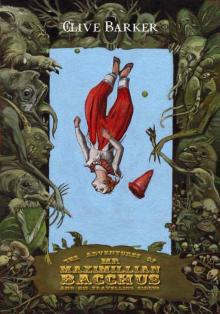 The Adventures of Mr. Maximillian Bacchus and His Travelling Circus
The Adventures of Mr. Maximillian Bacchus and His Travelling Circus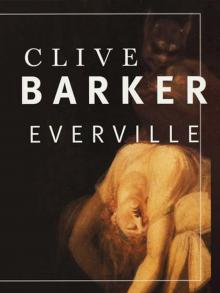 Everville
Everville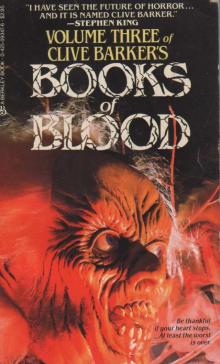 Books of Blood: Volume Three
Books of Blood: Volume Three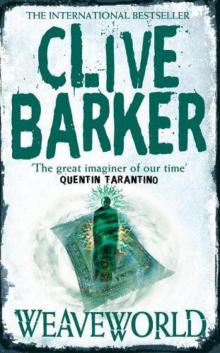 Weaveworld
Weaveworld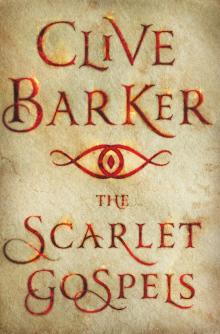 The Scarlet Gospels
The Scarlet Gospels Sacrament
Sacrament Books of Blood: Volumes 1-6
Books of Blood: Volumes 1-6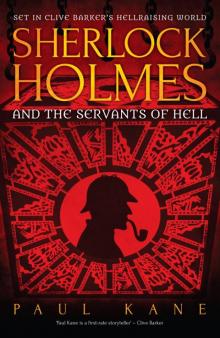 Sherlock Holmes and the Servants of Hell
Sherlock Holmes and the Servants of Hell Mister B. Gone
Mister B. Gone Imajica
Imajica The Reconciliation
The Reconciliation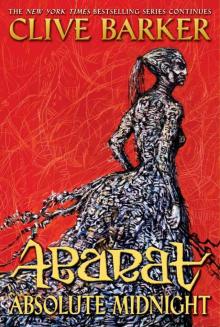 Abarat
Abarat Clive Barker's First Tales
Clive Barker's First Tales The Hellbound Heart
The Hellbound Heart The Inhuman Condition
The Inhuman Condition Infernal Parade
Infernal Parade Days of Magic, Nights of War
Days of Magic, Nights of War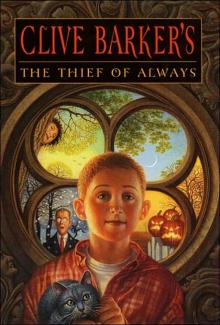 The Thief of Always
The Thief of Always Books of Blood Vol 2
Books of Blood Vol 2 The Essential Clive Barker
The Essential Clive Barker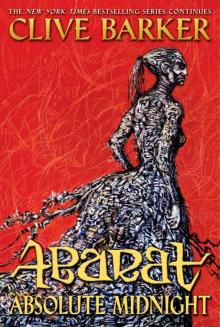 Abarat: Absolute Midnight a-3
Abarat: Absolute Midnight a-3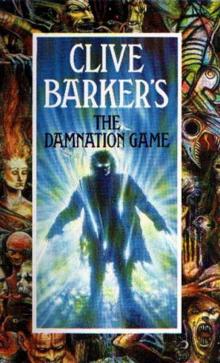 The Damnation Game
The Damnation Game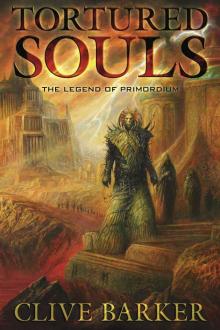 Tortured Souls: The Legend of Primordium
Tortured Souls: The Legend of Primordium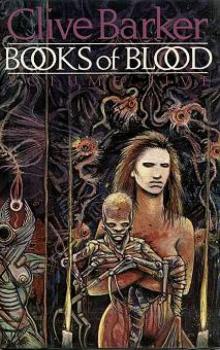 Books of Blood Vol 5
Books of Blood Vol 5 Imajica 02 - The Reconciliator
Imajica 02 - The Reconciliator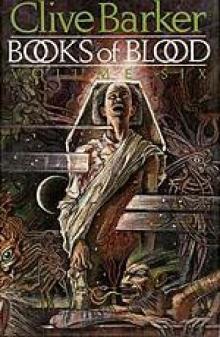 Books Of Blood Vol 6
Books Of Blood Vol 6 Imajica 01 - The Fifth Dominion
Imajica 01 - The Fifth Dominion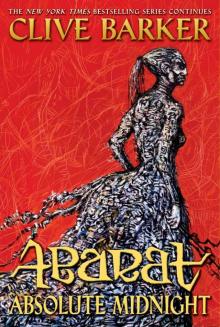 Abarat: Absolute Midnight
Abarat: Absolute Midnight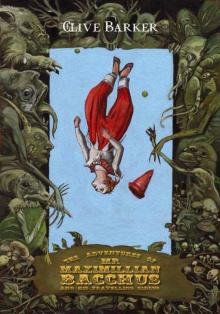 The Adventures of Mr. Maximillian Bacchus & His Traveling Circus
The Adventures of Mr. Maximillian Bacchus & His Traveling Circus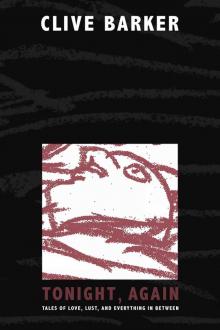 Tonight, Again
Tonight, Again Abarat: The First Book of Hours a-1
Abarat: The First Book of Hours a-1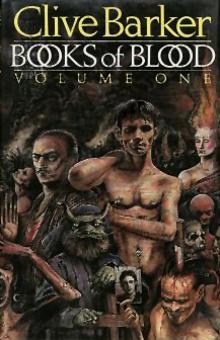 Books Of Blood Vol 1
Books Of Blood Vol 1 Age of Desire
Age of Desire Imajica: Annotated Edition
Imajica: Annotated Edition Complete Books of Blood
Complete Books of Blood Gutted: Beautiful Horror Stories
Gutted: Beautiful Horror Stories Shivers 7
Shivers 7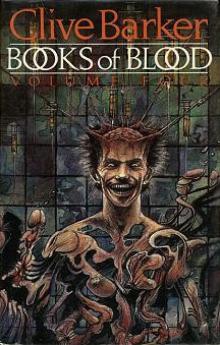 Books Of Blood Vol 4
Books Of Blood Vol 4